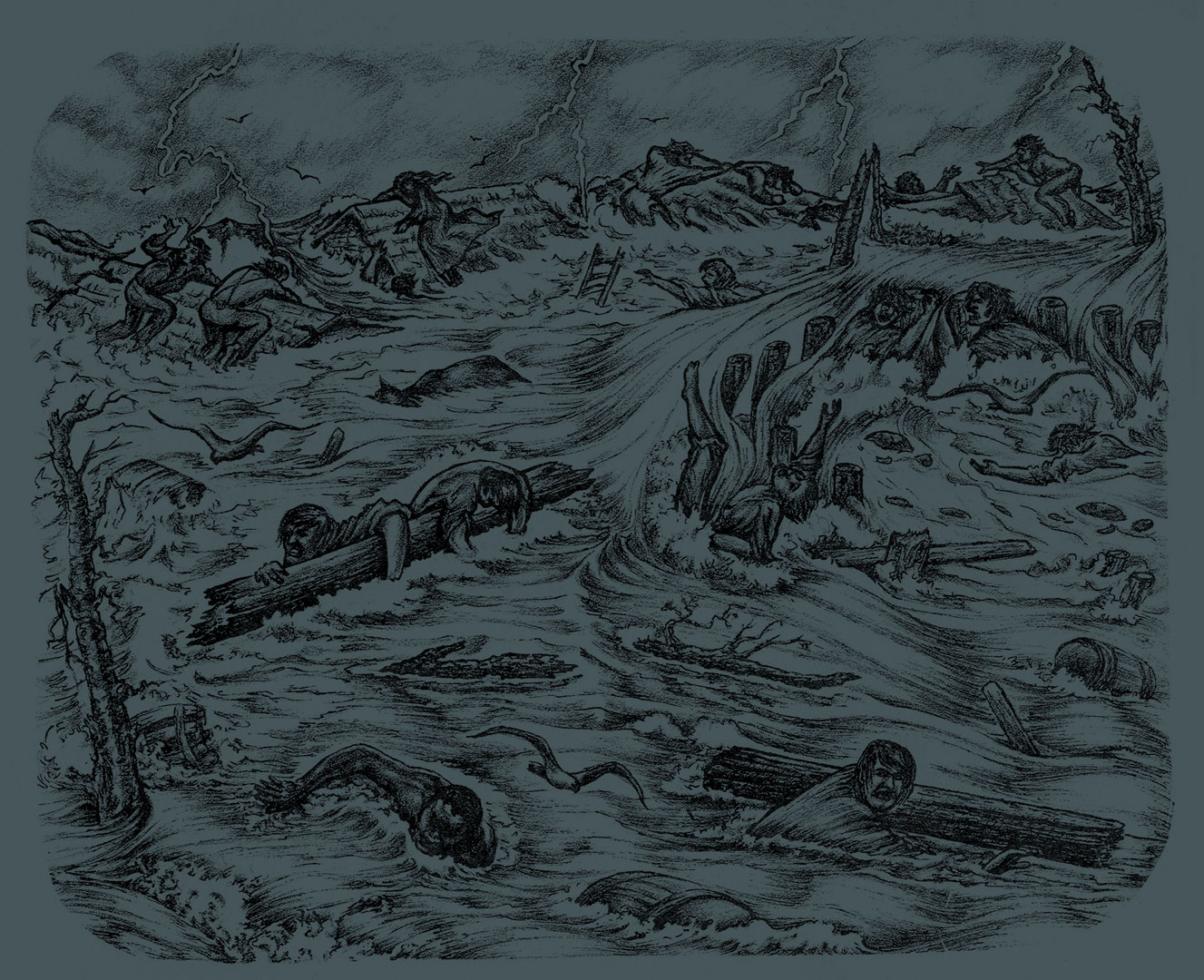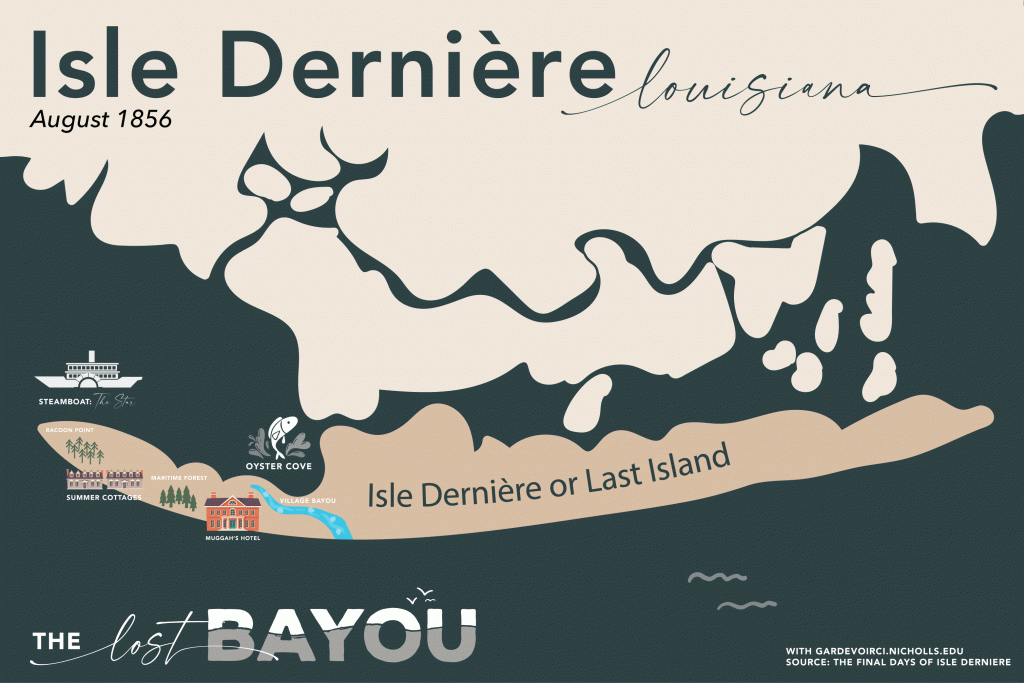
By Michael Gros Brand & Visual Editor
The four Muggah brothers were riding high at the opening of the 1856 summer season on Isle Dernière. In February of that year, a deal was struck with investors from the St. Charles Hotel in New Orleans to improve the hotel. Construction was set to begin at the end of the season and the goal was to construct the largest hotel in North America. The new and improved hotel would be capable of hosting 1,250 guests, have a new 320-foot by 60-foot dining room and 1,250 feet of double-decker galleries overlooking the Gulf of Mexico and the surrounding bay.
By the beginning of August, with just one month to go before the season expired and people went back to their lives on the mainland, the island’s population grew to 400 residents, all vying to soak up the last remaining days of summer. Among the 200 guests staying at the hotel were Mrs. Laura Sims and her husband. Mrs. Sims had overcome a serious illness which then caused her to be diagnosed with dropsical. “The physicians who attended me recommended surf bathing.” she said in an 1895 letter to the Shreveport Times, “They thought Last Island the best place for me, as it had notoriety as a health resort, we were nothing loth to go.”
On Friday, the 8th of August, guests began to notice the breeze shift and start coming from the North East. As people were walking back to their homes, they noticed an overabundance of seabirds taking shelter in the islands dense forest behind the summer cottages. Also, that night, the frogs and cicadas had fallen silent leaving the island eerily silent. One visitor, Captain Jimmy of the yacht Atlantic, noticed the higher than usual tide and brought his concerns to Thomas H. Ellis, a captain and son of a wealthy Terrebonne Parish sugar farmer. With his 40 years of experience as a sailor, he feared Isle Dernière would be in severe danger within 48 hours.
Saturday morning was like any other Saturday. Fishing and hunting, surf bathing and riding were the norms. The steamer Star, helmed by Captain Smith made a scheduled run to Morgan’s Railroad, modern-day Morgan City, and would make a quick turnaround for the second round of guests. By evening, the much-anticipated ball at the Muggah hotel was underway. While a storm was raging outside, guests danced and drank wine to ease their concerns about the storm. Captain Dave Muggah, the youngest of the brothers Muggah, assured guests. That they were experiencing the worst of the storm and assured his guests that wine and music would ease their minds. “If the storm doesn’t blow over by morning,” he said to his anxious guests, “no fear, the steamer Star will soon arrive to take you all back to the mainland.” Little did Captain Muggah know, the Star had been blown off course.
Colonel W.W. Pugh states in his memoirs that “all our cares vanished as we danced. Little were thinking of the sad changes which a few hours would bring about. I recall with sadness the skill and taste of the old German; whose violin furnished the exquisite music, which charmed so many. Our party broke up after midnight, and the exhausted crowd sought their couches fortunately ignorant to the fate which awaited in a few short hours.”
On Sunday morning, the. Star docked safely back on the mainland, however, Captain Smith insisted that he return to Isle Dernière to save as many lives as he could. Riding with him was Thomas Ellis. By early afternoon, the brunt of the hurricane was upon the island. Walls of storm surge engulfed the island from the Gulf and Calliou Bay. By 2 o’clock, the first floor of all structures were engulfed with water and by 3 o’clock, the wind gusts began to rip apart the cottages on the island. Within seconds, a tidal wave smashed the maritime forest on the west end of the island.
As the hotel took on water, guests scrambled to the second floor to escape the storm surge. As they clung together, the second floor began to wobble and buckle from the wind. A welcomed sight was the smokestacks and lanterns of the Star. Island resident Michael Schlatre walked through blinding rain to the hotel to watch the steamer dock safely. Shortly after, his slave found him to report that his home was gone. Thomas Eilis stood on the bow of the Star to survey the island. To his horror, no structure was standing. Captain Smith and Ellis began to lift survivors into the hull, who had formed a human chain to pass people safely to the ship. According to guest Dr. Thomas Kramer, the last person in the chain was a slave girl. She was lost as the hotel gave way.
Around 4, the winds died down. Mrs. Sims said “By this time I was almost dead. Looking up we saw not more than 100 yards from us the hull of the Star, a stranded wreck, chimney gone, cabin cutaway, and one of the large side wheels lying upon the deck.” If it weren’t for the brave Capt. Smith, who saw her and her husband and roped them to safety, they would have perished. Just as the winds calmed, they reared their ugliness, this time changing direction as the eye moved over the island. For the rest of the night, wind, rain and waves battered the drowning island.
The following morning, all was quiet. The Star had taken the place of the hotel. Except for the remaining people on the steamer, only one cow, one horse, and a few sheep survived. By Tuesday, a resort guest named John Davis made his way to the Brashear City Hotel to alert people that Isle Dernière had been washed away. As South Louisiana awoke to the news of the island, many other communities faced the same disaster. The village of Abbeville was flattened and sugar cane fields and rice fields were destroyed in the bayou parishes. It is estimated that 200 people died on Isle Dernière, it is unknown how many other lives were lost because of this storm.
The Last Island Hurricane was a category four storm when it made landfall with estimated sustained winds at 150 miles per hour. Reverend R. S. McAllister, who was visiting the island and survived the storm, retold his account of the storm in and 1891 memoire. “If only we had been martyrs, at least we could have been conscious of dying for adherence to some great principle. But, alas, not one of us was at a post of duty to mankind. Not a soul on this island had any business being here.”


